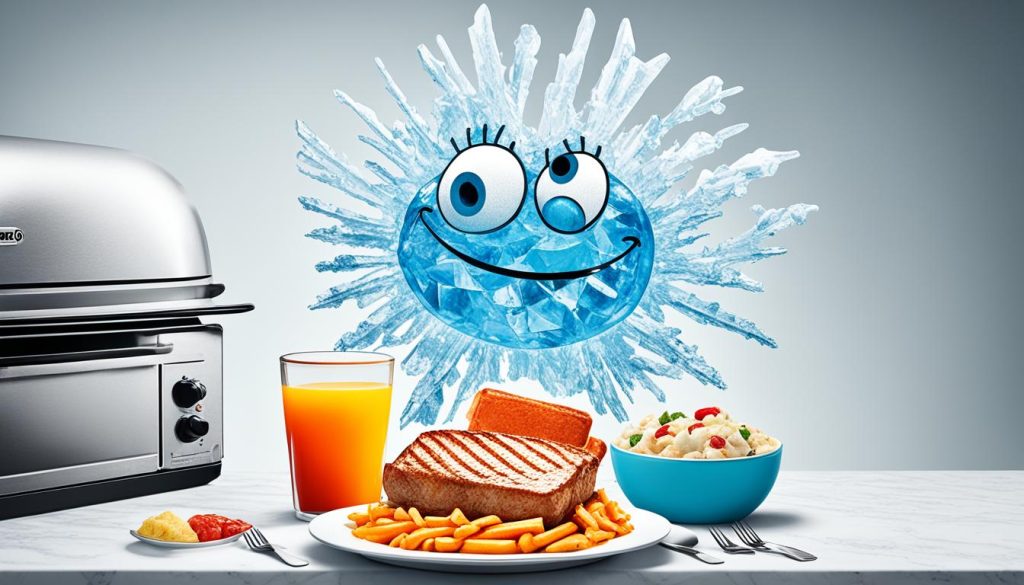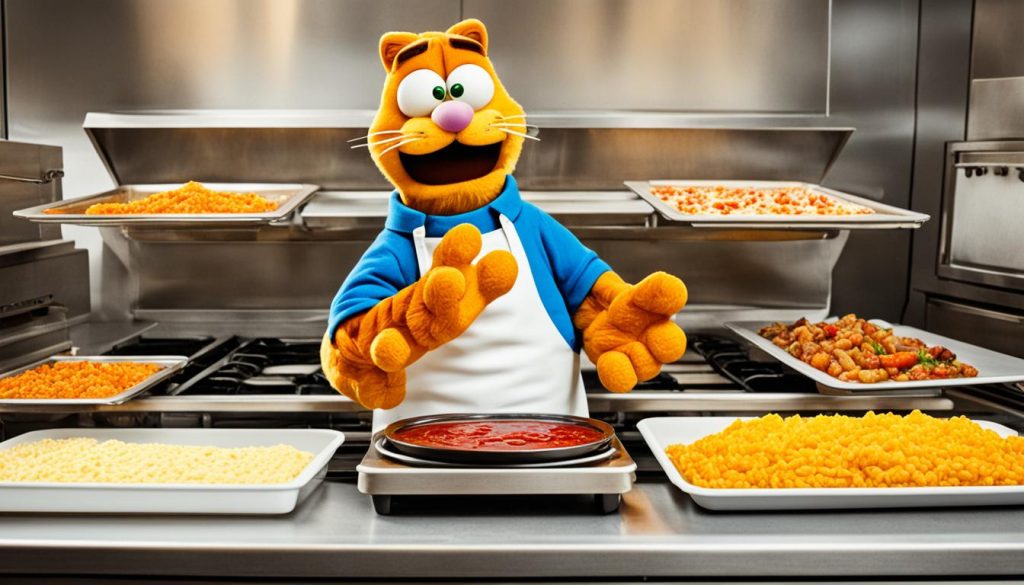When one stumbles across the phrase, “Why do they call it oven when you of in the cold food of out hot eat the food”, it’s hard not to scratch your head in bewilderment. Yet, this linguistic puzzle captures the imaginative and often humorous spirit of internet culture. The seemingly nonsensical question isn’t just a random jumble of words; it has evolved into an enigma of oven-related humor that both confuses and delights the online community. As we dive into this digital phenomenon, we aim to unfurl the layers of context that transform cold food musings into hot viral content.
Whether it’s about taking cold food from the fridge or the gratifying experience of eating hot food fresh out of the oven, the cultural curiosity behind kitchen appliances takes an interesting turn with such queries. They spark discussions, memes, and a unique collective exploration of language and irony that ignites the digital world.
Key Takeaways
- Discover the origin of the viral phrase surrounding oven usage and cold food.
- Explore how a simple question can evolve into a widespread internet meme.
- Understand the role of playfulness and absurdity in meme culture.
- Examine the impact of such enigmatic phrases on online communication and humor.
- Gain insights into the layers of meaning behind food-related jokes on social media.
The Mysterious Rise of a Nonsensical Query
The digital landscape is often witness to the unpredictable virality of online content, and the mysterious rise of a certain nonsensical query perfectly encapsulates this phenomenon. A baffling string of words, which appears to defy logic, has become an iconic presence in internet culture.
Origins of the Incomprehensible Meme
The origin of the meme that left many pondering, “Why do they call it oven when you of in the cold food of out hot eat the food”, can be credited to a tweet that dissolved into the digital ether, only to resurface with a potent dose of virality. The bewildering query, through sheer absurdity, grabbed the attention of netizens worldwide.
Social Media and the Spread of a Digital Phenomenon
Like wildfire, the meme proliferated across major social media platforms, from the microblogging twists of Twitter to the image-centric realms of Tumblr and Reddit. It became a resounding echo in the vast hallways of digital dialogue, an instant shorthand for the humor found in the absurd.
Why Garfield Became the Face of the Meme
The choice of Garfield, the beloved cartoon feline, as the avatar for the meme’s propagation seems almost preordained. The Garfield meme, picturing Jon Arbuckle in a state of existential questioning, morphed into the perfect vessel for the nonsensical query, marrying the ridiculous with the relatable.
| Platform | Impact on Meme Spread |
|---|---|
| Origin point, facilitated rapid sharing and engagement | |
| Tumblr | Visual edits proliferated, birthing numerous variations |
| Discussion and further meme evolution in niche communities |
Why Do They Call It Oven When You Of In the Cold Food Of Out Hot Eat the Food
The internet is a playground for linguistic acrobatics, where the power of word play comes to life in unexpected ways. The popular phrase “Why do they call it oven when you of in the cold food of out hot eat the food” is a sterling example of how meme culture capitalizes on the bewildering humor that emerges from food-related jokes and the jumbled syntax we’ve come to adore.
The Role of Irony and Nonsense in Meme Culture
In the labyrinth of online expression, the paradoxical and the nonsensical reign supreme. Meme enthusiasts relish in generating laughter and intrigue through playful misuse of language; it is here that the power of word play not only entertains but becomes a badge of creativity. The sheer absurdity of asking why we call it an oven in the context mentioned engages viewers in a shared experience of confusion and humor—a cornerstone of effective meme culture.
How Memes Reflect and Shape Online Communication
Through the dense fog of internet dialogue, memes like “Why do they call it oven…” pierce through, capturing attention with their linguistic somersaults. These snippets of thought do more than make us laugh; they shape the very way we communicate online. Food-related jokes and memes inadvertently create a common language, reflecting the nuances of a community that values quick wit and the element of surprise.
Interpreting the Subtext of Viral Phrases
Peering beneath the surface of viral phrases reveals a rich subtext waiting to be unraveled. The humor isn’t just in the misalignment of words but in the meme’s ability to echo shared sentiments or question everyday experiences. It’s a mosaic of cultural references, and in dissecting the anatomy of these phrases, we grasp a deeper understanding of meme culture and its resonance with the digital audience.
| Linguistic Feature | Role in Memes | Example from “Oven” |
|---|---|---|
| Irony | Create contrast between expectation and reality | The expectation of logical language vs. the presented nonsense |
| Nonsense | Captivate attention through confusion | Disordered sentence structure |
| Food-related Humor | Engage with universally understood topics | Oven as the pivot of the joke |
| Word Play | Showcase wit and creativity | Play on the word ‘oven’ and its functions |

The Cultural Impact of Internet Memes
The world of online communication has been profoundly transformed by the cultural impact of internet memes. These digital snippets capture the zeitgeist of our times, often through the powerful use of irony and nonsense. The meme phenomenon, especially prominent phrases that go viral, serves as a mirror to the evolving language and humor found in virtual spaces. Memes do not merely reflect society’s pulse; they actively contribute to the rhythmic narrative of our daily lives, increasingly so within the informal forums of social media.

The Role of Irony and Nonsense in Meme Culture
It’s the blend of irony and nonsense that gives meme culture its distinctive edge. This concoction allows internet users to question reality, humor, and the limits of conventional expression. Memes create a playground where normality is often inverted, leading to laughter and contemplation. From the bewildering to the absurd, viral content drives engagement by appealing to a sense of play and the pleasure of unexpected connections.
How Memes Reflect and Shape Online Communication
The thread of online communication is intricately woven with memes that pull together communities from all corners of the web. Memes are the new currency of social interaction online, fostering a shared experience that is both inclusive and diverse. They encapsulate complex emotions and viewpoints in a digestible format, often serving as an entry point to broader discussions or as succinct commentary on current events.
Interpreting the Subtext of Viral Phrases
Peeling back the layers of viral phrases reveals a depth that might initially be hidden by their playful façade. The subtext of these snippets often taps into cultural narratives, societal norms, or political sentiments. It’s through memes that many find a voice to comment or criticize, cloaked in the guise of humor. Decoding these messages becomes an intriguing exercise for the digital archaeologist, eager to understand the lexicon of the internet age.
| Meme Aspect | Cultural Impact | Example |
|---|---|---|
| Irony | Challenges conventional thinking | “Why do they call it oven” tweet |
| Absurdity | Celebrates nonconformity | Random cat memes |
| Viral phrases | Encapsulates the moment’s ethos | “I can has cheeseburger?” |
| Online communication | Engages virtual communities | Use of hashtags |
Linguistic Acrobatics: The Power of Word Play in Memes
The realm of internet memes is a testament to the playful elasticity of language and a rare showcase of linguistic acrobatics en masse. Memes like “Why do they call it oven when you of in the cold food of out hot eat the food” are not merely comedic posts; they are a display of the power of word play. This meme – a whirlwind of syntactical chaos – has managed to burrow into the complex fabric of online culture, prompting laughs, confusion, and countless shares. Word play in memes engages readers at a cognitive level, inviting them to find the humor in language deconstruction and reconstruction, much like solving a puzzle.
These concoctions of text and image display a dexterity with words that goes beyond simple puns or dad jokes; it’s a form of creativity that can spark widespread resonance in internet memes. This linguistic prowess garners particular favor among younger generations, who are deft at picking up subtle nuances and appreciate the clever use of language that memes often encapsulate. By dissecting grammar, twisting expected structures, and surprising with nonsensical yet somehow meaningful phrases, memes become a playground for linguistic innovation and experiments in humor.
The power of such memes is undeniable when considering their viral nature and the ease with which they navigate across borders, languages, and cultures. They are shared, remixed, translated, and even studied for their impact on communication and society. It is through these examples of linguistic acrobatics that one can observe how language evolves and adapts in digital spaces, reinforced by the agile minds of netizens worldwide. It highlights how the playful manipulation of words is not just a means to amuse but also acts as a dynamic catalyst for engagement in the ongoing, ever-changing discourse of the digital age.


